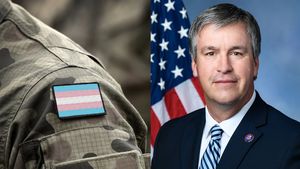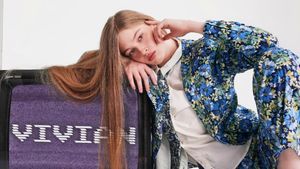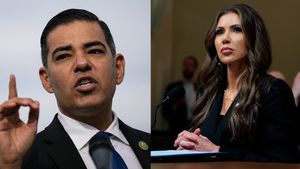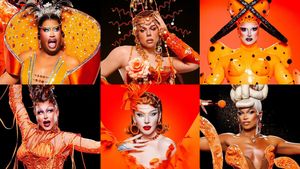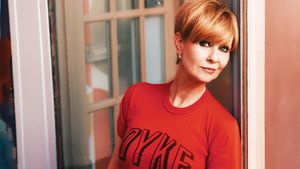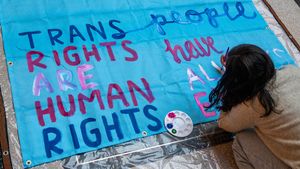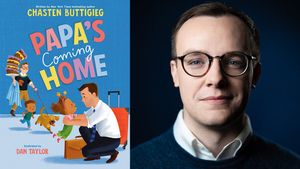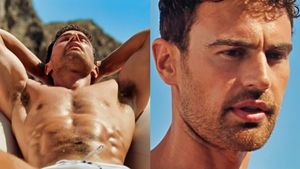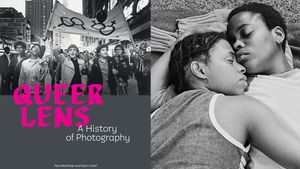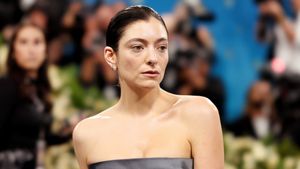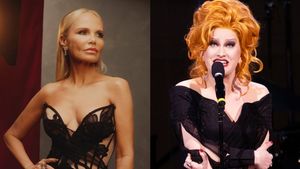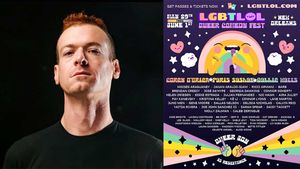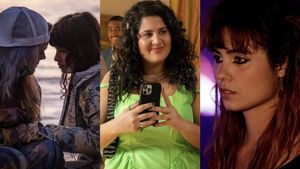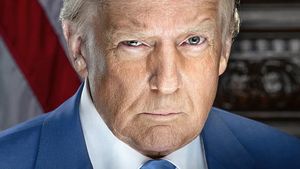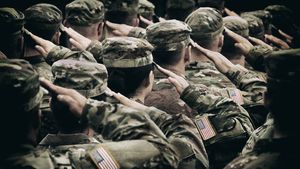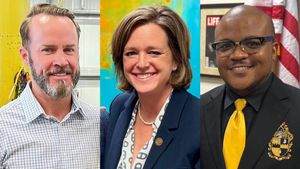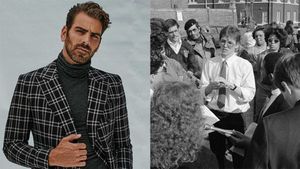Even though 67% percent of women in the U.S. are plus-size (meaning a dress size 14 and up), and plus-size clothing makes up nearly 18% of all total apparel sales (generating $17.5 billion in 2014), there is still a major lack of inclusion when it comes to the plus-size retail market, especially when you consider that many major fashion brands still don't sell to women of size or include them in their advertising and marketing campaigns.
That lack of representation for over half of American women is something Corissa Enneking, the mastermind behind the Fat Girl Flow blog and YouTube channel, hopes to help change through her posts about fashion and body positivity.
PRIDE got the chance to learn more about why Corissa started her blog, why body positivity should include the intersections of gender identity and race, and how, through visibility, plus-size women are yearning to be a part of the mainstream fashion landscape.

PRIDE: What's the meaning of the "FatGirlFlow" title, and why did you start it as your blog/YouTube channel?
Corissa: I actually started blogging on Tumblr four or five years ago. I did it really casually, and then I asked everyone if they would be interested in me going legit with my blog. It was right around the time when that people hashtagging things like #WorkFlow and #WorkoutFlow, and you know, everything was about your "flow" for the day. So I was like 'This is my Fat Girl Flow.' Everything about me is my Fat Girl Flow. I started the blog in April of 2015, and it picked up pretty quickly because I did a series of 'where to shop' posts, and the big one that I did was 'where to shop for people plus-size, over the size of 24 and up. That got pretty big, pretty fast and it kind of helped me springboard into plus-size fashion stuff.
I started my YouTube channel in November of 2015. What I really wanted to do with my YouTube channel was to connect more with my audience and make it more personal and let them be able to see me try on clothes. My whole idea for it was to try the clothes on on-camera so people could see what it looks like having a fat body get in and out of clothing and to normalize it. Just to see someone wiggling into jeans. I think we all have this picture of what someone wiggling into their Calvins looks like, and I really wanted to do that with fat bodies and just give more representation to fat bodies.
PRIDE: So you created the channel in response to not enough plus-size representation in fashion media?
Corissa: Yes. There's really not a lot of plus-size bloggers. We are outnumbered so, so much and in mainstream media, you really don't see fat bodies at all. When you get on YouTube, there are people like Loey Lane who is pretty popular for being plus-size, and even she is on the smaller side of the plus-size spectrum. I just thought with a size 24/26 body, people need to see it.
PRIDE: What kind of feedback do you tend to get from people on your YouTube videos and blog posts?
Corissa: Generally speaking, the people who find me are very much seeking out what I am putting out there. I don't think people just happen upon most of my stuff unless they have found it from a mainstream media article, which doesn't happen super often. I get a really, really great response. People say things like 'Wow! I've never seen someone who looks so much like me and has so much confidence and just put their body out there for people to see.' I just did a lingerie haul, and a lot of people say 'I've never seen anyone with my body in lingerie. And you looks so beautiful! If you can look beautiful, I can look beautiful!' That is always amazing to hear, those kinds of responses.
PRIDE: You have quite a lot of followers/readers/subscribers. How does it feel knowing you can make a positive impact in this kind of way?
Corissa: I love it. To me, it really just shows how much we need the normalization and the representation of fat bodies. I think that this is something that people have really been aching for. I don't think that I'm necessarily extra good at my job, or extra confident, or anything like that. I think people are dying for this. People really have been looking for people to represent them for so long, and they see it, and they just immediately fall in love with it. I know that I have viewers and readers who don't share all of my values and my ideals, and they still follow me because this representation is so important to them.

PRIDE: Influencers always have to deal with trolls and nasty comments. How do you respond to people who don’t have nice things to say online?
Corissa: I've actually had to recently rethink my approach to this. Until maybe a week ago, I would have said that my approach was just to ignore people. I really didn't feel like it was my responsibility to pander to people, or make them believe a certain thing. Now, I do think that one of the things I've learned from the recent election is that maybe my place in all of this is to take a second and speak up a little bit more when I can. I know that there are people on the internet who really are just trolls and who I will never be able to actually speak with. Who I will always just have to ignore and turn the other cheek and I'll never get through to them. But I hope that in the next year, and in the upcoming years, that I can really speak to more of the people who seem somewhat open to new ideas, who come at me with hatefulness. I'm going to try to work on that a little bit more. I'm going to try to change my approach, and not ignore as many things, and try to engage with people who I think could benefit from talking with someone like me.
PRIDE: You made a video talking about intersections that are ignored within the body positive community, specifically race and gender identity. Why do you think those intersections get ignored?
Corissa: I think that the reason those intersections get ignored is because in whatever way, we are programmed through our society to not recognize those things, especially through media. Also, we live in this society that kind of says that excluding people for their race, for their gender, is okay. I know that I personally start from a place where I think body positivity is about bodies. Period. What are some of the bodies that we don't see? What are the bodies that we don't see in media? Who are the people who don't see their bodies represented? It's so important that we are intersectional with that, and that we recognize that it's not just people who look like me. It's not just fat white women. It's people of all races, all genders, all sexualities. I think we leave a lot of people out, and I do not want my channel, or my appearance, to make it seem like I am complacent in that.
We view the world in such black and white thinking. We have a tendency to go all in with these movements, and it can be a little bit misguided at times. You see those posters that are like 'Real women have curves.' but there is a balance here. We do want to advocate for everybody, and body positivity is so much more than just being fat. It's about all bodies.
PRIDE: Why is it so important for plus-sized people to have visibility and representation in the fashion world?
Corissa: At least for me, growing up, I really thought that style was something that I had to be a certain size for. I really thought that if I was not thin, if I didn't have a thin body, that I would be doomed to a lifetime of wearing sweatshirts and sweatpants forever and that I could not be stylish in my own fat body. Style gives all of us this outlet to express ourselves and show people what we feel like inside, to express that outwardly. When we don't get to do that, I think we really internalize a lot of our body issues. For me, that led to eating disorders and a lot of body shame and just guilt about how I looked and not really loving myself. I think that part of representation is just showing people you do not have to be thin and look a certain way for you to express who you are on the inside. You can do that at any moment in your life. You can do that at any size. You can be any race, and shape. However you look, you can do that at any moment. And I think that that's really important for people to hear, and more importantly, for people to see.

PRIDE: What brands do you think are doing plus-size clothing right? Which brands do you think are doing it wrong?
Corissa: I am always hopeful that mainstream brands will get it right. I will never give up that hope, and the truth is, on the back end of things, when I talk to companies, when I talk to peoples' marketing departments, I really do find that the people involved with brands really do care. There are a lot of body positive people involved with mainstream brands. Eloquii is one of them. I think that there are a lot of people that care there. Simply Be is a pretty great brand. There are several others. There are a couple of indie brands. Ready to Stare and Proud Mary Fashion, they are amazing. Knowing the people who work for them really makes you believe in those companies.
I will say this though, especially about the more mainstream companies: it seems like good ideas can go wrong very quickly. To me, inclusivity really feels fairly natural. It doesn't feel like something difficult to do. But time and time again, we see brands like Lane Bryant doing there big campaigns where they're doing parades and stuff, where they're having someone at the parade talk about weight loss. And they're only selling shirts up to size Extra-Large. It's like they're using the words so that they can get the media attention, but they don't have the backbone behind it. And that is, for me, just so disappointing. I wish I could say that there is this huge list of mainstream companies tat i think are just kicking ass, but unfortunately, there's just not. You can pretty much put everybody the opposite side of that list (of brands who get it wrong).
PRIDE: What is your go-to item of clothing this fall season?
Corissa: Jackets! This is so silly, and I'm sure that so many plus-size people will identify with this, but probably since I was 15, I have not worn jackets because I could not find jackets that fit my arms. I couldn't lift my arms above my head or do anything if I wore a jacket. Finally, there are now jackets that being created in sizes above an extra-large, so I can finally buy things. It's like a whole new aspect to your wardrobe. Jackets. Leather jackets. Any kind of camo jacket that looks a little bit grungy. I'm into those very much this year.
PRIDE: What change do you think needs to be made in the fashion industry in order for there to be equality and representation for plus-size bodies?
Corissa: I think that companies should have a more holistic picture of who their customer is. I think a lot of us have been pigeon-hold into the idea of 'fat women who are waiting to be thin.' I think that if companies could quick looking at us as 'plus-size bodies who think plus-size clothing is just an interim' I think they could start nailing some stuff. If we were looked at as people who enjoyed our bodies and are who are happy with who we are, I think maybe we could step it up a little. The fashion industry has always looked at us as a throwaway group, as someone who they just need to clothe to get by, and I think that really reads in what they are selling us. The few companies I have seen that have stepped it up and said 'Hey, you get to look like a badass right now, right this second. You don't have to lose weight. You don't have to do anything,' I think they're really knocking it out of the park. If everyone could look at us like that, I think maybe then we'd finally get some trendy clothes, with the season.

Watch Corissa's latest video below, and check out her blog and YouTube channel for more fun and stylish body positivity!
(All photos courtesy of FatGirlFlow.com)













































































